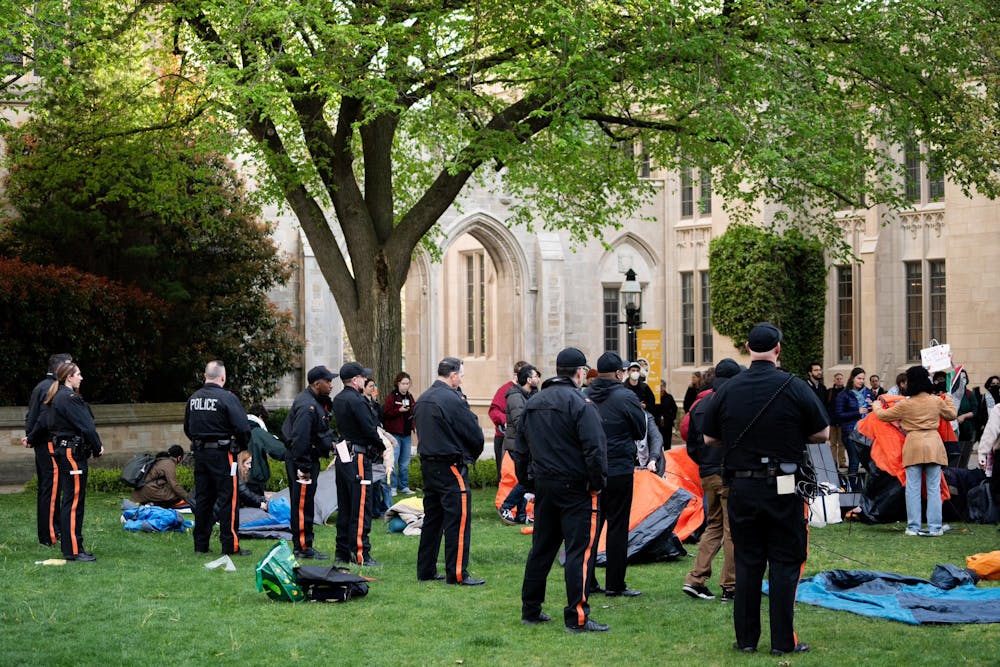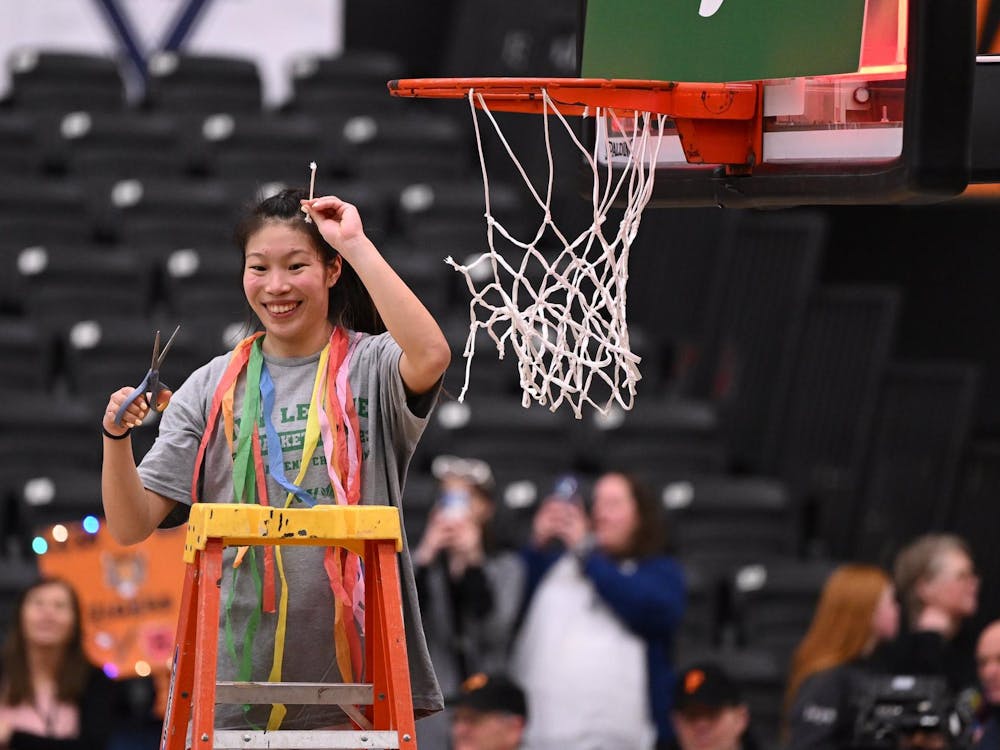Early Thursday morning, the Department of Public Safety arrested two graduate students for taking initial steps to establish encampments in McCosh Courtyard. Princeton authorized arrests within six minutes of the first tents being set up.
This comes after five days of alarming crackdowns on student protests at universities nationwide, including the arrest of over 100 protesters at Columbia, over 120 protesters at NYU, and over 47 protesters at Yale. Before today, the University had not made extreme attempts to suppress student speech — and Princeton had stood out for holding a deep commitment to free speech.
But now, Princeton is following other schools’ lead by responding aggressively to pro-Palestine protests. Princeton has a very small window of opportunity to reverse course and mitigate the damage that it has done. The University must reject the repressive tactics that it began practicing this morning and instead follow its tradition of productive dialogue with protesters. We urge Princeton to cease student arrests and to refrain from expelling students simply for engaging in prolonged protest. We also urge the University not to repeat the mistakes of Columbia, NYU, USC, and others in inviting police onto campus to arrest peaceful protesters.
The University’s departure from its free speech ideals began at 10:08 a.m. on Wednesday when W. Rochelle Calhoun, Vice President for Campus Life, sent an email to the student body. Calhoun wrote that “some types of protest actions (including occupying or blocking access to buildings, establishing outdoor encampments and sleeping in any campus outdoor space) are inherently unsafe.” Thus, individuals involved in these actions “who [refuse] to stop after a warning will be arrested and immediately barred from campus.”
Calhoun’s email, which cited the “disruptions” occurring nationally, was a response to Gaza Solidarity encampments at other colleges and likely also a response to leaked documents about the now ongoing pro-Palestine encampment at Princeton. But Calhoun’s characterization of these sorts of protests — occupations, sit-ins, and encampments — as “inherently unsafe” is incorrect, and endangers our community. Targeting these encampments with immediate arrest and disciplinary action is a break from Princeton’s traditionally respectful and accommodating treatment towards sit-ins and other forms of prolonged protest, and it fails to be “viewpoint-neutral,” as Calhoun claims.
Princeton, notably, has not disciplined students for occupations in the past: In 2015, the Black Justice League (BJL) sat in the office of President Christopher L. Eisgruber ’83 for 33 hours. And in 2019, Princeton Students for Title IX Reform (PIXR) organized a sit-in outside Nassau Hall that lasted nine days. Both protests occurred under the watchful eyes of President Eisgruber and Calhoun, yet protesters were not warned of, or punished with, arrest. In fact, administrators engaged with the protesters, leading to direct policy changes. Destiny Crockett ’15 recently clarified in a statement to The Daily Princetonian Editorial Board that students participating in the BJL sit-in were not threatened with “arrest, just suspension and expulsion,” and ultimately “did not face disciplinary action.” Just because Princeton can legally enforce punishment does not mean that it should, especially in a biased manner.
The current threat of disciplinary action for engaging in “unlawful” actions that result in arrest has not been applied to students who have been subject to legal proceedings in the past. For example, Larry Giberson ’23 — a student who was indicted by a grand jury for participating in the Jan. 6 riots at the U.S. Capitol by the end of his senior year — graduated from Princeton on time with no disciplinary action taken against him. He has since been convicted for his involvement. The discipline Calhoun laid out in her email, and the arrests undertaken this morning, are therefore incongruent with past precedent.
Despite the fact that they have occured peacefully, and brought about change within the University before, Calhoun seeks to justify harsh disciplinary action against protests like these by characterizing them as “inherently unsafe.” It is true that the encampment here has the potential to stir up discourse, discord, or even counter-protests. But these are reflections of the University’s ideals of open debate, not matters of safety. Claiming controversy justifies suppressing speech under the guise of security and order is out of line with Princeton’s principles of free speech. Indeed, disallowing activism on the basis of its potential for inciting instability because the topic is contentious amounts to censorship. Princeton stopped these protests almost before they started: The Department of Public Safety even prevented students from setting up their tents.
The University must reevaluate its priorities and align its actions now with its previous stance of prioritizing free speech and education. That means engaging in productive dialogue with protesters, as was done with BJL and PIXR demonstrators, and ensuring the continued education of all of its students, including student protesters. We urge Princeton to alter its course now. Do not arrest more students for using activism to engage in contentious conversations. Do not expel any students for participating in peaceful protest. Change the repressive interpretation of University policies outlined in Calhoun’s email on Wednesday morning. This is the only way that Princeton can hope to begin to refurbish its reputation — as a champion of student rights, student safety, and a defender of open discourse.
148th Editorial Board
Chair
Henry Hsiao ’26

Members
Eleanor Clemans-Cope ’26
Davis Hobley ’27
Henry Hsiao ’26
Sarah Park ’27
Abigail Rabieh ’25
Christofer Robles ’25
Naisha Sylvestre ’25
Lucia Wetherill ’25
Leo Yu ’27
The 148th Editorial Board is the institutional voice of The Daily Princetonian and consists of nine members: an appointed Chair, two managing editors, the public editor, and a group of five Opinion section editors and columnists. It convenes on an ad hoc basis to discuss issues and current events of interest to the Princeton University community, as well as collectively write signed editorials addressing them, which reflect the consensus of a majority of the Board’s membership. To ensure independence, the Board works separately from the newsroom of the ‘Prince,’ and its members do not cover the topics of their editorials in that capacity for the paper.








